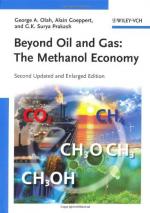|
This section contains 260 words (approx. 1 page at 300 words per page) |

|
Since methane is almost always a byproduct of organic decay, it is not surprising that vast potential reserves of methane have been found trapped in ocean floor sediments. Methane forms continually by tiny bacteria breaking down the remains of sea life. In the early 1970s it was discovered that this methane can dissolve under the enormous pressure and cold temperatures found at the ocean bottom. It becomes locked in a cage of water molecules to form a methane hydrate (methane weakly combined chemically with water). This "stored" methane is a resource often extending hundreds of meters down from the sea floor.
Some petroleum geologists believe that there may be more methane trapped in hydrates than what is associated with natural gas reserves. However, as an energy source, there is considerable uncertainty whether this methane can ever be recovered safely, economically, and with minimal environmental...
|
This section contains 260 words (approx. 1 page at 300 words per page) |

|



